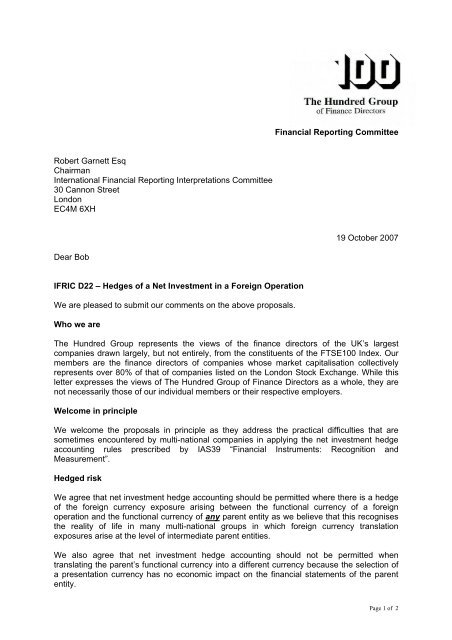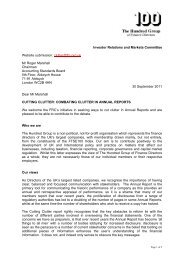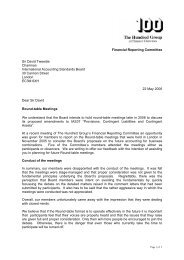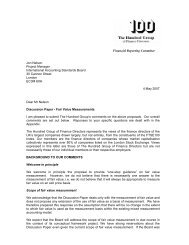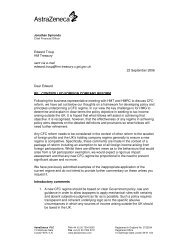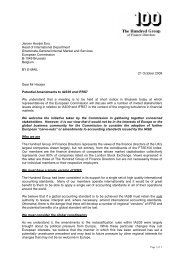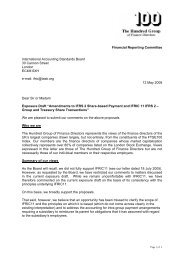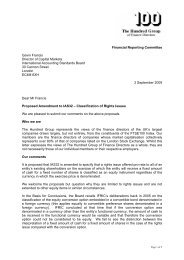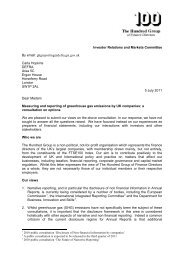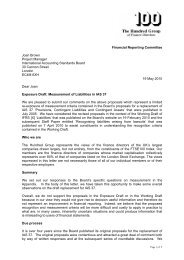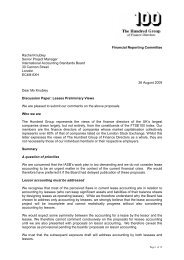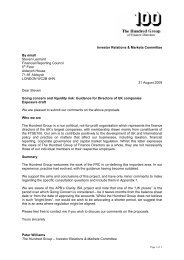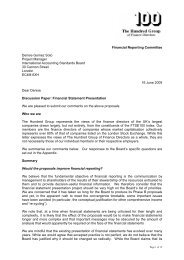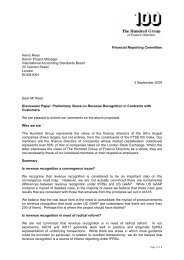Financial Reporting Committee Robert Garnett Esq Chairman ...
Financial Reporting Committee Robert Garnett Esq Chairman ...
Financial Reporting Committee Robert Garnett Esq Chairman ...
Create successful ePaper yourself
Turn your PDF publications into a flip-book with our unique Google optimized e-Paper software.
<strong>Robert</strong> <strong>Garnett</strong> <strong>Esq</strong><br />
<strong>Chairman</strong><br />
International <strong>Financial</strong> <strong>Reporting</strong> Interpretations <strong>Committee</strong><br />
30 Cannon Street<br />
London<br />
EC4M 6XH<br />
Dear Bob<br />
IFRIC D22 – Hedges of a Net Investment in a Foreign Operation<br />
We are pleased to submit our comments on the above proposals.<br />
Who we are<br />
<strong>Financial</strong> <strong>Reporting</strong> <strong>Committee</strong><br />
19 October 2007<br />
The Hundred Group represents the views of the finance directors of the UK’s largest<br />
companies drawn largely, but not entirely, from the constituents of the FTSE100 Index. Our<br />
members are the finance directors of companies whose market capitalisation collectively<br />
represents over 80% of that of companies listed on the London Stock Exchange. While this<br />
letter expresses the views of The Hundred Group of Finance Directors as a whole, they are<br />
not necessarily those of our individual members or their respective employers.<br />
Welcome in principle<br />
We welcome the proposals in principle as they address the practical difficulties that are<br />
sometimes encountered by multi-national companies in applying the net investment hedge<br />
accounting rules prescribed by IAS39 “<strong>Financial</strong> Instruments: Recognition and<br />
Measurement”.<br />
Hedged risk<br />
We agree that net investment hedge accounting should be permitted where there is a hedge<br />
of the foreign currency exposure arising between the functional currency of a foreign<br />
operation and the functional currency of any parent entity as we believe that this recognises<br />
the reality of life in many multi-national groups in which foreign currency translation<br />
exposures arise at the level of intermediate parent entities.<br />
We also agree that net investment hedge accounting should not be permitted when<br />
translating the parent’s functional currency into a different currency because the selection of<br />
a presentation currency has no economic impact on the financial statements of the parent<br />
entity.<br />
Page 1 of 2
Location of the hedging instrument<br />
We welcome the proposal that the hedging instrument in a hedging relationship designated<br />
as a net investment hedge may be held by any entity within the group (except the foreign<br />
operation that itself is being hedged) as we believe that this recognises the way in which<br />
many multi-national groups manage their foreign currency translation exposures.<br />
We agree that an exposure to foreign currency risk arising from a net investment in a foreign<br />
operation should qualify for hedge accounting only once. However, we believe that the<br />
practical implications of this principle should be explained more clearly either in the body of<br />
the interpretation or by way of the illustrative examples.<br />
Effectiveness testing<br />
We agree that in assessing the effectiveness of a net investment hedge the change in value<br />
of the hedging instrument should be computed by reference to the functional currency of the<br />
parent entity against whose functional currency the hedged risk is measured but we believe<br />
that it would be helpful if effectiveness testing in this context could be demonstrated in the<br />
illustrative examples.<br />
Transitional arrangements<br />
We believe that the transitional arrangements are rather convoluted. We would recommend a<br />
simple statement to the effect that the interpretation should be applied prospectively from the<br />
date of initial application. Otherwise, there is a risk that the interpretation may be viewed as<br />
encouraging preparers to backdate the designation and documentation of hedging<br />
relationships.<br />
Differences between IFRS and US GAAP<br />
We understand that US GAAP is more restrictive than IFRS with regard to net investment<br />
hedge accounting. While we would not recommend convergence with US GAAP in this<br />
respect, we suggest that the relevant differences between IFRS and US GAAP are<br />
considered in the “Basis for Conclusions”.<br />
Please feel free to contact me if you wish to discuss our comments on the proposals.<br />
Yours sincerely<br />
Ken Lever<br />
<strong>Chairman</strong><br />
The Hundred Group - <strong>Financial</strong> <strong>Reporting</strong> <strong>Committee</strong><br />
T: +44 (0) 20 8877 5140<br />
F: +44 (0) 20 8874 3882<br />
E: klever@tomkins.co.uk<br />
Page 2 of 2


